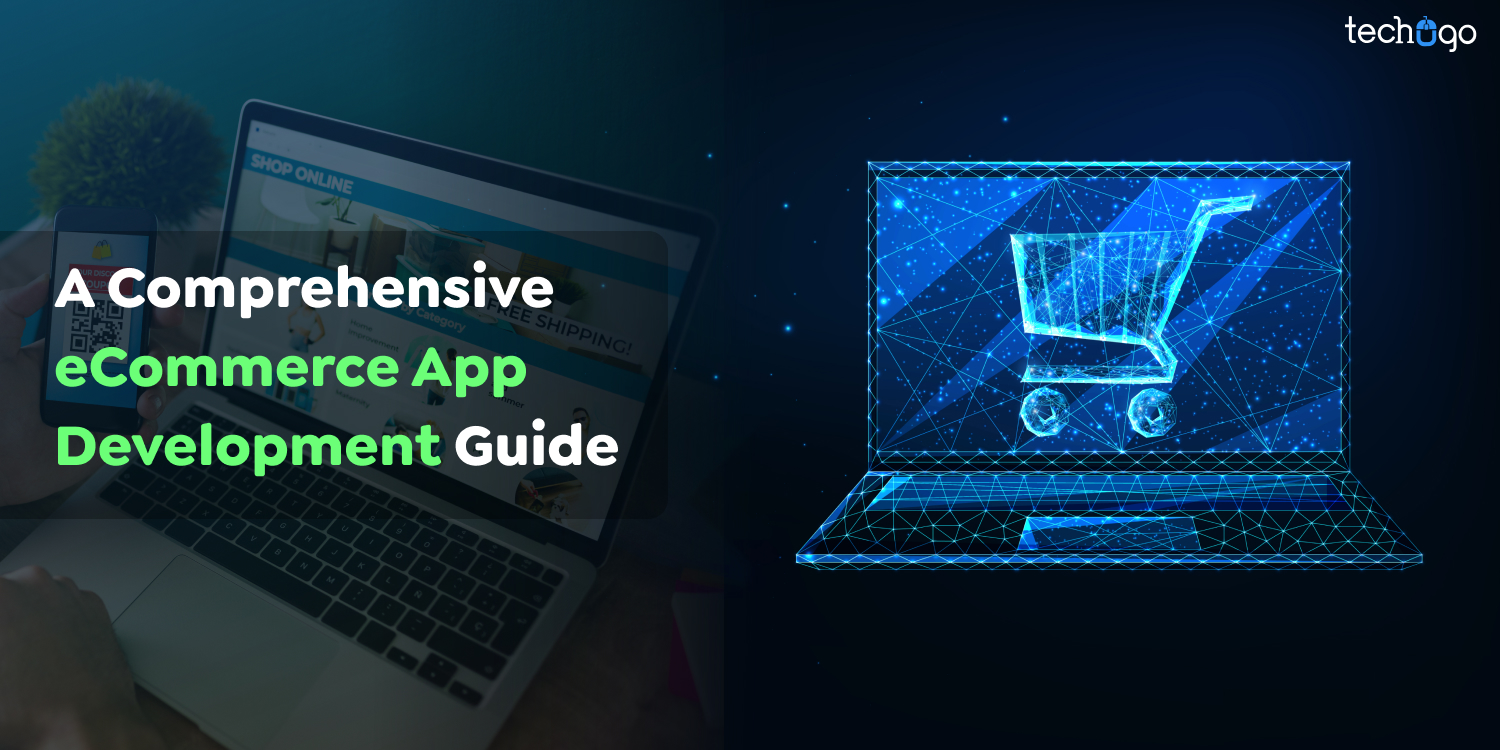21 Feb 2025
A Comprehensive eCommerce App Development Guide
Matthew Connor

The growth of mobile eCommerce apps is rapidly accelerating in the current digital age, providing users with easy access to online shops that enhance the shopping experience. eCommerce app development solutions help businesses communicate with their clients and boost sales.
With the rise of eCommerce apps, businesses are redefining the way we shop. What was once an analog environment has transformed into a completely new digital world. Mobile devices are no longer just a convenience for the few; people regularly use their phones to purchase groceries, clothes, home goods, and luxury items.
Between 2021 and 2027, global eCommerce revenues are projected to rise by nearly CAD 4.25 trillion, marking a 59.8% increase overall, with a staggering average annual growth rate of 8.1%. As with many consumer behavior trends sweeping the globe, the eCommerce app trend has gained significant acceptance among consumers worldwide. As a result, eCommerce app development has become crucial for businesses globally.
If you’re considering launching your eCommerce app, you already understand the importance of delivering an exceptional experience to your clients. The landscape will change rapidly by 2025, with Gen Z playing a major role in this shift. 70% of online natives use mobile apps for shopping, and they are quickly becoming your primary client base.
What is eCommerce App Development?
eCommerce applications facilitate buying and selling through digital transactions. These apps serve as marketplaces where customers can use their mobile phones or devices to find businesses, browse services, compare items, and shop from anywhere.
Essentially, they function as virtual stores. They’re especially beneficial for companies just starting to expand, helping to increase their reach, engage customers, and boost global sales. The growing interest in mobile online shopping apps is a direct result of the increasing digitization of transactions, reflecting how people are developing new ways to interact with businesses.
Types of eCommerce Applications
Companies have different requirements when it comes to their eCommerce strategies. There are many types of eCommerce app development to choose from.
Business-to-Consumer (B2C)
B2C eCommerce platforms enable businesses to sell their products and services directly to consumers. In developing such applications, the focus should be on delivering a smooth as well as enjoyable shopping experience through easy-to-use interfaces, personalized recommendations, and secure payment systems. Some of the most well-known examples of B2C apps are Amazon and Walmart, which allow customers to browse various products, compare prices, and quickly make purchases.
Business-to-Business (B2B)
B2B eCommerce platforms facilitate business transactions, allowing companies to purchase products and services from other businesses. These platforms are designed to manage large orders, complex pricing models, and long-term agreements, meeting the needs of manufacturers, wholesalers, and distributors. Popular B2B applications in the marketplace, such as Alibaba and Amazon Business, connect suppliers and buyers worldwide.
Consumer-to-Consumer (C2C)
C2C eCommerce platforms serve as marketplaces for consumers to buy and sell goods or services. These platforms act as intermediaries, allowing users to list items for sale, connect with potential buyers, and complete transactions securely. Craigslist and eBay are among the most popular C2C apps, enabling users to trade second-hand products, sell handmade items, or even offer services.
Consumer-to-Business (C2B)
C2B eCommerce platforms allow consumers to offer products and services to businesses. These applications disrupt the traditional commercial model by enabling consumers to set their own prices to attract companies seeking specific items. GitHub and iStock are prominent examples of C2B eCommerce apps.
Benefits of eCommerce App Development
The eCommerce app development services offer businesses numerous benefits, including increased sales, improved customer engagement, enhanced brand visibility, and greater customer loyalty. By providing a dedicated app, businesses can access the growing mobile customer base and meet the needs of on-the-go shoppers. Some of the key advantages of eCommerce apps include:
Enhanced User Experience
eCommerce apps provide a smooth and user-friendly interface that allows shoppers to easily navigate through items and make purchases with just a few clicks. The ability to restore previous purchases makes it even easier, enhancing the overall shopping experience.
Increased Sales and Revenue
Online shopping apps act as a direct sales channel, eliminating the need for intermediaries. By offering their customers a convenient as well as seamless shopping experience, these apps can significantly boost sales and revenue.
Hassle-Free Shopping Experience
Customers prefer a simple and hassle-free buying experience. An eCommerce mobile app simplifies the purchasing process, making it easier to search for products and complete payments. Moreover, you can engage with customers in real-time and use push notifications to inform them about sales, new product launches, and other updates.
In-Depth Customer Insights
To ensure success, businesses need to understand what customers are looking for. An eCommerce app provides valuable data on customer location, preferences, purchasing patterns, and more. This information helps businesses tailor their interactions with customers and improve customer service.
Improved Customer Loyalty
eCommerce apps can enhance customer loyalty by offering a more personalized experience. By using analytics and data, businesses can offer customer-specific deals, promotions, and product recommendations.
Cost-Effective Marketing
eCommerce app development is an effective and affordable marketing tool, offering an easy way to reach customers. Push notifications allow you to inform customers about sales, new products, or special offers, without the high costs of traditional marketing campaigns.
Competitive Advantage
A mobile-friendly eCommerce app gives you a competitive edge. It demonstrates your ability to adapt to consumers’ preferred shopping methods, setting you apart from competitors and attracting new customers looking for a more convenient shopping experience.
Key Features of eCommerce Apps
eCommerce app development capabilities can make the shopping experience enjoyable and seamless. In this section, we will discover vital features that could boost business growth!
User Accounts
An app that supports eCommerce offers safe registration, login, and profile management. Users can track their order history and even save wishlists. Users’ accounts allow customers to look up purchase histories. This feature is designed to provide a personalized experience.
Admin Panel
Administrators are in charge of overseeing and managing all aspects of the shopping process. To make their work easier, we’ve added the admin panel to make it more efficient. This panel will help the administrator manage client, order, and store administration tasks with ease. It will also make the most complex functions, like rewards, promotions, or filters, easier.
Product Catalog & Search Functionality
With a clear product display and easy filters, shoppers will quickly discover the product they’re looking for. Searching tools help refine the results so consumers can browse the categories and compare different items. If you’d like to display the best products you offer without overwhelming customers, stick with these characteristics!
Payment Gateways
The ability to integrate mobile commerce apps with popular payment methods such as credit/debit cards and PayPal. Mobile wallets like Apple Pay and Google Pay can also assist customers in making purchases quickly. If you create an eCommerce app and payment gateway, it will provide an easy and secure payment process.
Shopping Cart & Checkout Process
An easy-to-navigate cart allows customers to review the options before making their purchase. Different payment options, such as credit and mobile wallets, allow for versatility. When you develop an online shopping application, it is possible to have the smoothest payment. This feature can help enhance your customer’s satisfaction.
Social Media Integration
The integration of social media sharing features enable app users to share their favorite products or services with their family, peers, and acquaintances. You can use social media platforms to boost your brand recognition and encourage user engagement.
Order Tracking & Notifications
A further feature essential to eCommerce mobile app development is tracking orders and notification. Customers can easily monitor their purchases. Customers also get updates about delivery, shipping, and any modifications. In addition, real-time notifications ensure clients know each step in the delivery and shopping process.
Analytics
The applications should have analytics capabilities to let you know how your E-Commerce store is performing. This can help you improve your store and target prospective customers. Analytics can provide details such as the number of Customers, E-Commerce sales conversion rate, e-commerce mobile stats, and more. After Analytics is configured, it will be accessible within the e-commerce app.
Ratings & Reviews
eCommerce app development solutions allow users to give feedback and ratings on products. This way, they assist others in making better decisions. By using this technology, it is possible to understand customers’ preferences and enhance your product. This is an excellent method to establish confidence and educate future customers!
Push Notifications
Push notifications provide customized offers, reminders, and notifications directly to users. If, for instance, you wish to offer your clients discounts, your mobile application should be able to notify users of the offer. This will help you stay in touch with your customers and increase your sales.
eCommerce App Development Process
How do you build eCommerce-related apps? eCommerce mobile app development is a simple process that brings your concept to life. Let’s take a look at the steps involved!
App Conceptualization
The most important step in the eCommerce app development process is conceptualization. This stage involves a deep analysis of the market, consumers, competitors, and customer demographics. It reveals which features users engage with, as well as the unique marketing strategies required to help your company stay competitive in the market.
Choose The Right Technology
In the development of eCommerce mobile applications, it is crucial for eCommerce app development company to select the best technology that perfectly fits your needs and budget. Key decisions include choosing the appropriate programming language, frameworks, databases, and third-party solutions such as payment gateways and analytics tools. Some popular options include React Native for cross-platform development, Node.js for the backend, and MongoDB for the database.
UI/UX Design
Once you have defined your concept, the next step is to design the user interaction (UX) and user interface (UI) for the app. Focus on creating visually appealing, user-friendly layouts with simple navigation. Ensure your design includes clearly defined images, intuitive navigation buttons, engaging videos, and a straightforward checkout process.
eCommerce App Development
At this stage, developers focus on both the front-end and back-end of the application. The chosen tech stack powers everything from navigation to security. This ensures your application functions properly and includes the most powerful features. It is important to follow the Agile Development Lifecycle methodology to continuously improve the app and remain adaptable.
Testing and Quality Assurance (QA)
The app must be secure and free from bugs. QA professionals test it for speed, security issues, and performance to ensure customer safety. It’s also important to check for any performance-related problems. If possible, both manual and automated testing should be conducted to achieve the best results. This is like conducting a final test before launching, ensuring a smooth purchasing experience by catching any issues early on.
App Launch
The app launch is when all your hard work comes to fruition! This is the moment to release your app on platforms. To stand out in the very competitive market, you need to optimize your app with App Store Optimization (ASO). After the launch, be sure to monitor the app’s performance and user reviews.
Post-Launch Maintenance and Support
The launch of your app is just the beginning. After the app goes live, you’ll need to fix bugs, incorporate new features, and ensure compatibility with new devices and OS versions. Regular updates will keep your customers happy and engaged. By maintaining your app, it will continue to shine!
Choosing The Right E-Commerce App Development Platform
When considering e-commerce app development, there are several options to choose from. The platform you select will depend on factors such as your budget, deadlines, desired features, and target market. Here are three options to consider:
Native App Development
It involves creating separate apps for iOS and Android platforms using their respective programming languages. Native apps provide superior performance and user experience but require more time and money to develop.
Hybrid App Development
Hybrid app development uses web-based technologies like HTML, CSS, and JavaScript to develop a single app that can run across multiple platforms. Although hybrid apps offer quicker development times and lower costs, they may not provide the same level of performance as native apps.
Progressive Web Apps (PWAs)
Progressive Web Apps (PWAs) offer an app-like experience while being accessible via a browser. PWAs are created using web technologies and can be downloaded to the home screen of a user’s device. PWAs provide cross-platform compatibility and easier maintenance but may have limitations in accessing some mobile device features. When choosing a platform, make sure to consider factors like the intended app’s performance, target market, development tools, and future scalability.
How Much Does It Cost to Build an E-Commerce App?
Well, the cost of building a successful eCommerce app can greatly differ depending on the complexity and features. A basic app with simple features like a shopping cart and encrypted payment system may cost between CAD 25,000- CAD 70,000. More complex apps with features like AI, IoT, or AR could cost between CAD 90,000 and CAD 170,000, or even more.
The total cost of eCommerce app development depends on various factors, including project complexity, required features, UI/UX design, technology stack, the location of the development team, and more. The level of complexity significantly impacts the price. The more intricate the app, the more time and money it will take to develop. Below is a breakdown of cost estimates based on complexity:
Basic Ecommerce App
A simple eCommerce app development typically includes essential features such as product listings, search functionality, user registration, and a basic checkout process. It may also include basic review and rating systems. Developing a basic eCommerce app can cost between CAD 3,000 and CAD 20,000.
Moderate Complexity Ecommerce App
A moderately complex app includes all the basic features, plus additional capabilities such as payment systems, user profiles, social media integration, push notifications, chat support, and product tracking. These apps may also offer personalized product recommendations based on user behavior. The cost for developing a moderate complexity eCommerce app ranges from CAD 20,000 to CAD 40,000.
Complex Ecommerce App
A complex eCommerce app includes all the features of a moderately complex app, with advanced features such as Augmented Reality (AR), advanced analytics, Artificial Intelligence (AI) for personalized shopping experiences, and integration with sophisticated backend systems and third-party applications. These apps require advanced UX/UI design and a robust backend to ensure high performance and flexibility. The development cost for a complex eCommerce app typically starts at CDA 80,000 or more.
Challenges in eCommerce App Development
Developing eCommerce apps, despite their many benefits, comes with several challenges. There’s much to be done throughout the process to ensure everything runs smoothly!
API Integration
API integration can be a challenge in eCommerce mobile app development. Integrations must work seamlessly for the app to function as expected. The app needs to connect to third-party providers such as shipping companies, payment gateways, and inventory management tools. Each of these integrations requires careful planning.
Security Concerns
Security should be a top priority when creating an eCommerce app. It’s essential to protect payment data and users’ personal information. Additionally, preventing fraud, which could impact either you or your customers, is critical.
To secure your app, consider using private cloud storage and encrypting data stored within the app. Periodic security audits should also be conducted after the app’s launch to ensure continued protection.
Congruity in Marketing Strategies
Another issue in mobile app development to support eCommerce is the way you manage marketing. The app needs to be compatible with your online marketing campaigns, promotions and brand. Also, ensure that the app is in line with the goals of your company while providing an effortless user experience.
Scalability
When your company expands it will require the application to manage greater volumes of products, traffic and data from customers. If your application isn’t capable of scaling, issues with performance could be present at any point. Be aware of this when creating your online shopping apps. Make sure you plan for scalability from the start to ensure the app remains reliable as your business expands.
Cross-Platform Compatibility
Your customers may use a variety of devices, such as iOS, Android, or tablets, and many may access the app via web browsers. When developing your eCommerce mobile app, ensure it works seamlessly across different platforms. While this is the goal, achieving cross-platform compatibility can be challenging.
Trends in eCommerce App Development
As technology continues to advance, it’s important to stay updated with the latest trends in eCommerce app development to stand out in the industry!
Augmented Reality (AR)
Augmented Reality (AR) is transforming eCommerce app development by making shopping more immersive and interactive. With AR tech, shoppers can virtually try on clothes or they can also see how furniture will look in their own homes, all within the app. This enhances the buying experience, reduces returns, and boosts customer satisfaction. As virtual reality (VR) grows alongside AR, the potential for creating authentic shopping experiences increases.
Voice Search Integration
The use of voice-enabled shopping is a great way to enhance your shopping experience on m-commerce apps! The voice assistants, such as Google Assistant and Alexa let customers shop and browse in a non-hands-free manner. Imagine speaking “Order ceramic cups,” and you’re completed! Through voice-based integration your e-commerce application makes a statement because it delivers an experience that is modern and designed for busy shoppers.
One-Click Purchase
Thanks to this feature, customers are able to complete their purchases by pressing a button. A streamlined checkout process helps save time and makes shopping simple. Companies also benefit since faster checkout times mean less abandonments of carts and better conversion rate.
Progressive Web App (PWA)
PWAs provide quick, reliable, and similar experiences in your mobile device’s browser. Customers don’t have to download or install anything. Simply click and buy! These solutions make it easy for businesses to connect with more customers and lesser hassle.
Conclusion
Presently, eCommerce firms are developing customer-centric applications that are now part of everyday life. Innovative technologies enhance the shopping experience by being responsive and enhancing customer interaction. eCommerce app development has been accelerated rapidly to meet customer demand. Customers have set expectations of app developers for e-commerce, wanting to experience the ease of visiting stores from home.
eCommerce app development is an intricate process. However, it can provide many positive effects on your business. When it comes to deciding on eCommerce applications of any kind, the blending of essential components must be carefully considered.
A good way to create an eCommerce app is to collaborate with app development companies that provide custom-designed mobile apps. Work even more closely with firms whose strength lies in fast-paced development. They will likely create the perfect mobile eCommerce app to translate your eCommerce goals into business.
Get In touch
We are excited to here from you and let’s start something special Together. Call Us for any inquiry.
Write us
sales@techugo.caJust a call away
About you




